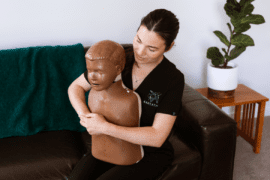By Adrienne Wood
“How are you going on that Science Fair project of yours, Rosa?” asked Maria tentatively, putting a hand on her daughter’s arm. Rosa shrugged her hand off irritably and continued busily sticking down test tubes and small pieces of information beside each with a frown on her face. Maria watched her, hesitant to interrupt, holding a piece of paper in her hand.
“What do you want?!” Rosa eventually groaned, turning on Maria with a sharp look.
“Oh…it’s just…” Maria looked apologetic. “It’s just that Ms Norton wants you to sign this form for the Science Fair to say it’s all your own work.”
“Ms Norton is an idiot!” Rosa erupted in exasperation. “Can’t she tell it’s all my own work? Only an idiot would think I’d have copied the idea to do a science fair project on different types of animal manure fertiliser.”
“It’s not personal darling,” said Maria in a soothing voice. “All the kids entering the fair have to sign the form. Let’s get it over with before dinner shall we? I have dinner all ready and waiting on the table, love.”
“Oh for goodness’ sake Mum!” exploded Rosa. “Don’t think I’m eating that rabbit food of yours again! Just go get me takeaways like last night….” Rosa turned moodily back to her project. “Rabbit food…” she muttered to herself darkly.
Maria put a hand to her throat. “But darling… I’ve cooked it especially. It’s very healthy for you.”
Rosa continued mechanically gluing and sticking down her board, caught up in her own world. Maria walked away shaking her head. I guess I’ll just have to drive down to the shops again she thought to herself. It’s not as though it’s fair to expect her to keep working on an empty stomach.
About Alpha
There are two sets of instincts in the parenting dynamic, according to Dr Neufeld. One is in the instinct to take the lead: the “alpha mode” and the other is the instinct to be taken care of: the “dependent mode”. As parents, we generally take turns with our partner at taking the Alpha or the dependent mode depending on the context but in a parent-child relationship, usually the parent is in the alpha mode, and the child is in the dependent mode. Sometimes this gets turned on its head, and the child ends up in the alpha mode with the parent wondering how they lost their lead. Dr Neufeld calls a child who operates in the alpha mode most of the time, an “alpha child” or a child with an alpha complex.
So what’s the problem with Alpha?
There’s nothing intrinsically “wrong” with alpha instincts per se. They are an important and instinctive part of every single one of us. However, the alpha mode is healthiest in the context of caring for others. To be healthy, the drive to take charge should always be accompanied by a drive to assume responsibility for and to care for others, giving the one in the alpha mode the position that is best for providing for and protecting others.
A child who has taken the alpha mode in the parent-child relationship has the drive to take charge, but it is not usually accompanied by the drive to take responsibility for nor to care for others.
Alpha children can be very difficult to take care of. They can be bossy, controlling and demanding. They resist instruction or direction, must be in the know all the time and are driven to take centre stage. As parents, it is our job to support, care for, encourage, advise, guide and direct our children as they develop. An alpha child uses their lead to themselves become the one advising, directing and demanding our support.
What we fail to realise is that a child in the alpha mode is often a vulnerable child. They appear to be strong, confident, and in control, so it’s easy to step back and allow them to make their own decisions because they appear “grown-up” in so many ways. However, the drive to take control often masks an underlying sense of anxiety and alarm. Deep down, an alpha child knows they’re not quite ready for the responsibilities of the adult world, so why are they driven to take charge?
Why is my child Alpha?
Alpha by Default
A child can become alpha “by default”. This means the parent has not taken a firm lead in their relationship with the child creating a gap for the child to step in to. This situation can be created for many reasons, such as by overly casual or permissive parenting. It could be because the parent is overly anxious, indecisive or uncertain. It could be because the parent believes in creating an equal status between parent and child, possibly because their own parent was overly domineering. Or it could be because the parent is looking to the child to meet an unmet need in themselves such as a need for companionship.











